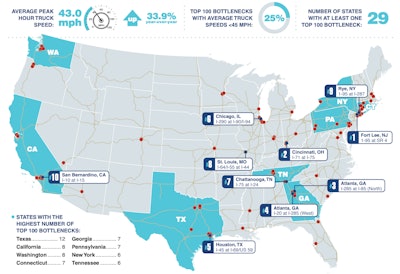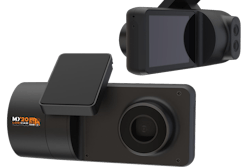Trucking news and briefs for February 24, 2021:
ATRI: Texas boasts most freight bottlenecks, but G.W. Bridge in N.J. the worst
 Texas had the most freight bottlenecks in 2020 with 12, according to ATRI's 2021 Top Truck Bottleneck List. California and Washington state were tied for the second most with 8 each.American Transportation Research Institute
Texas had the most freight bottlenecks in 2020 with 12, according to ATRI's 2021 Top Truck Bottleneck List. California and Washington state were tied for the second most with 8 each.American Transportation Research Institute
The intersection of I-95 and New Jersey Highway 4 at the George Washington Bridge in Fort Lee, New Jersey, is once again the worst freight bottleneck in the U.S. for the third straight year, according to research from the American Transportation Research Institute.
In its 2021 Top Truck Bottleneck List, ATRI measured the level of truck-involved congestion at over 300 locations on the national highway system. The analysis is based on truck GPS data from over 1 million trucks. The bottleneck locations detailed in the latest ATRI list represent the top 100 congested locations, although ATRI continuously monitors more than 300 freight-critical locations.
According to ATRI, states with the most bottlenecks in ATRI’s 2021 top 100 are: Texas, 12; California, 8; Washington, 8; Connecticut, 7; Georgia, 7; Pennsylvania, 7; New York, 6; and Tennessee, 6.

In addition to the bottleneck at the George Washington Bridge, the rest of the Top 10 freight bottlenecks are:
2. Cincinnati: I-71 at I-75
3. Atlanta: I-285 at I-85 (North)
4. Atlanta: I-20 at I-285 (West)
5. Houston: I-45 at I-69/US 59
6. Chicago: I-290 at I-90/I-94
7. Chattanooga, Tennessee: I-75 at I-24
8. St. Louis: I-64/I-55 at I-44
9. Rye, New York: I-95 at I-287
10. San Bernardino, California: I-10 at I-15
ATRI’s analysis, which utilized data from 2020, found that while there were COVID-related impacts on traffic across the country as car drivers stayed at home, the year was not without severe congestion. Average truck speeds at a fourth of the bottlenecks on ATRI’s list were 45 miles per hour or less, reflecting both a return to pre-pandemic freight demand throughout the year and the impact of numerous roadway construction projects in 2020.
PennDOT names bridges under consideration for tolls
The Pennsylvania Department of Transportation last week announced the bridges being considered for tolling to fund repairs or replacement of the bridges.
Through its PennDOT Pathways Major Bridge Public-Private Partnership (P3) Initiative, the department is working to find near- and long-term funding solutions for the state’s transportation system. PennDOT says one of the early findings from the study “is that tolling of major bridges in need of replacement or rehabilitation appears to be a viable near-term solution.”
Bridges being considered for tolling include:
- I-78 Lenhartsville Bridge Replacement Project (Berks County)
- I-79 Widening, Bridges and Bridgeville Interchange Reconfiguration (Allegheny County)
- I-80 Canoe Creek Bridges (Clarion County)
- I-80 Nescopeck Creek Bridges (Luzerne County)
- I-80 North Fork Bridges Project (Jefferson County)
- I-80 Over Lehigh River Bridge Project (Luzerne and Carbon counties)
- I-81 Susquehanna Project (Susquehanna County)
- I-83 South Bridge Project (Dauphin County)
- I-95 Girard Point Bridge Improvement Project (Philadelphia County)
The Pennsylvania Motor Truck Association believes the tolls “could be detrimental” to the trucking industry in the state, according to PMTA Director of Member Communications Brandon Moree.
“We operate in an industry with very thin margins, and this adds another tax for highway use that, at this point in 2021, it doesn’t match where we are and what we already pay.”
Moree noted that since 2013, the cost to operate one commercial motor vehicle 100,000 miles a year in Pennsylvania has increased by more than $7,000.
“Now, they’re asking trucking to pay the bill again,” he said. “We estimate these tolls will be roughly five times more expensive for trucks than passenger vehicles. Trucking already pays 40% of highway use taxes in Pennsylvania, so we have already paid more than our fair share.”
PMTA is encouraging Pennsylvania-domiciled truckers and carriers to reach out to their legislators, especially those around the nine bridges announced, and “let them know they don’t stand for additional taxing, particularly for highway use,” Moree said.
For drivers who live out of state but travel through Pennsylvania, PMTA is encouraging drivers to comment on PennDOT’s online comment form for any bridges they use (which can be found at the links in the list of bridges above).
“The bridges being considered for tolling through the Major Bridge P3 Initiative are structures of substantial size that warrant timely attention and would require significant funds to rehabilitate or replace,” PennDOT said in a press release. “Additionally, these bridges were selected based on the feasibility of construction beginning in two to four years to maximize near-term benefits, and with the intention that their locations are geographically balanced to avoid impact to just one region.”
ArriveCan electronic reporting requirement being phased in for U.S. drivers entering Canada, and Canadians leaving
As of this past Monday, February 22, the Canadian Border Services Agency (CBSA) was set to make it mandatory for travelers into and out of Canada to use its ArriveCan system -- including commercial truckers -- to report their trip in advance, with some phase-in exceptions as the government north of the border ramps up the system. It's part of the Canadian government's efforts to combat the spread of COVID-19 variants.
Mike Millian of the Private Motor Truck Council noted that his and other Canadian transport interests' efforts to get an exemption, extension or an alternative means of reporting were unsuccessful in the run-up to implementation of the electronic reporting requirement, yet the CBSA clarified more than one option for reporting, including a simple verbal declaration at the border itself as the electronic report requirement phases in.
With full phase-in, United States-based drivers who do not report their trip into the country could be denied entry, CBSA noted.
Drivers can use the ArriveCan app on their smartphones, available via this link to the Android version and this one for Apple devices.
Alternately, the same reporting can be done via the ArriveCan web portal on any internet-connected device.
For now, noted CBSA, "foreign nationals essential workers such as commercial truck drivers will not be denied entry if they do not have their ArriveCAN submission. ... Operational guidance has been provided to our front line officers in this regard, as well."








